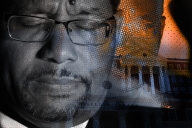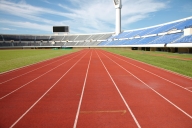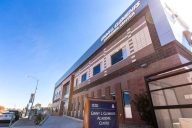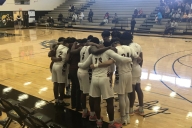You have /5 articles left.
Sign up for a free account or log in.
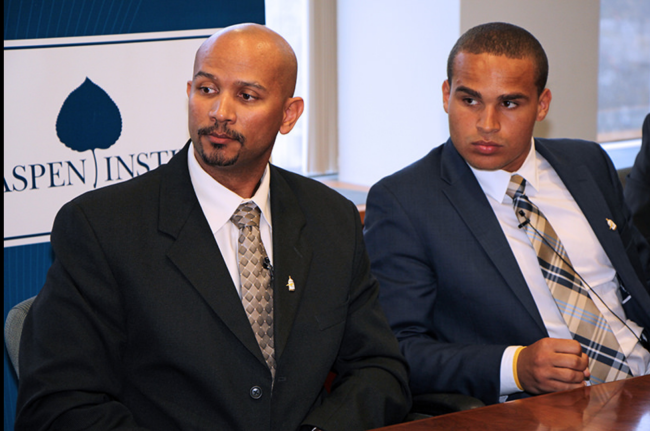
The Aspen Institute
WASHINGTON -- Former Northwestern University quarterback Kain Colter and Ramogi Huma, who helped him found the College Athletes Players Association, came to the nation's capital Thursday "to play a little defense." It's been just a few days since a National Labor Relations Board regional office director said Northwestern football players are employees of the university and will be allowed to unionize, and Colter and Huma are trying to keep up momentum by meeting with U.S. Congressmen including Harry Reid (D-Nev.), Sherrod Brown (D-Ohio) and John Conyers (D-MI).
"The last thing we want to see is the NCAA come up here and use their lobbying power to change the laws," Huma told reporters at the Aspen Institute on Thursday.
Several lawmakers have weighed in on the NCAA and CAPA. Reid and Brown both said athletes should be allowed to unionize, and Conyers has previously called for Congressional hearings on college sports.
Others have not been so supportive.
"Imagine a university's basketball players striking before a Sweet Sixteen game demanding shorter practices, bigger dorm rooms, better food, and no classes before 11 a.m.," Sen. Lamar Alexander, Republican of Tennessee, said in a statement after the NLRB decision. "This is an absurd decision that will destroy intercollegiate athletics as we know it."
But such fears are overblown, Colter said. Nothing is preventing any players from striking now -- as evidenced by the football players at Grambling State University, who refused to play in the fall because of poor management and facility conditions -- but CAPA isn't advocating that kind of action anyway.
"We already have the leverage," he said. "We need to negotiate, we don't need to strike."
The NCAA has said it's making progress on athlete welfare issues. Last week, officials announced that the restructured Division I Board of Directors will include one voting member who is an athlete.
Colter's not convinced.
"It doesn't change if they're going to listen to him," the soon-to-be NFL player said. "At the end of the day, you need leverage, and that's just what it keeps boiling down to.... promoting a student-athlete to talk in their meetings is not the same thing."
Huma said the NCAA is "putting lipstick on a pig."
Despite a common belief to the contrary, CAPA has said it's not looking to ensure players earn a salary. If they decide to unionize under CAPA in the secret ballot election planned for April 25, the athletes will be negotiating for things like increased scholarships and medical coverage, educational trust funds and more protective safety protocols.
Northwestern is appealing the regional decision to the full NLRB in Washington. Colter said he and his teammates don't see this movement as being for themselves.
"They're voting for the future generations," he said, adding that he thinks they'll vote to unionize. "It's really about, are you going to set these kids up for success? Are you going to allow them to have a voice, and guarantee them their basic protections, their basic rights?"
Whatever the full board decides, it will only apply to private institutions; athletes at public colleges will have to petition in their own states. (Generally, states in the Northeast, Midwest and West are more open to unionizing at public colleges and universities than are those in other regions.) Huma declined to comment on CAPA's latest organizing efforts, but said that Northwestern would be on "the right side of history" to support its athletes on this.
"Obviously, our vision is that college athletes across the nation will have the opportunity to decide whether they want the ability to collectively bargain," Huma said. "I think at the end of the day, we will come to a point where we can create a critical mass."
With the unionization, the growing body of lawsuits over concussions and image rights, and a huge anti-trust suit alleging the NCAA and five major conferences cap salaries illegally, the NCAA is facing attacks from multiple sides.
"I don't think the NCAA itself is going to go away, but I think a lot of its power is going to be stripped away," Huma said, "There's a drumroll right now, and I hope it's not the same result that we've seen in the last few years."

